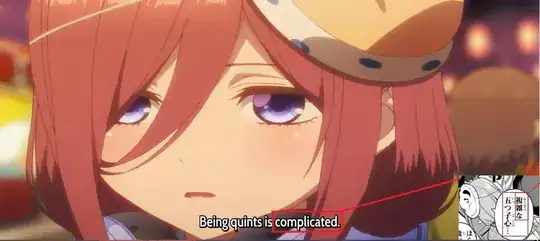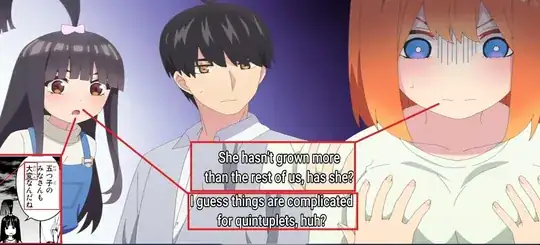In the anime adaptation of the manga The Quintessential Quintuplets, as well as the corresponding manga, there are these 2 scenes:
- Scene 1: (S01E04) Miku Nakano (a member of identical and the eponymous quintuplets) says that 'Being quints is complicated.' This is translated from '複雑な五つ子心.' (I guess:' Fukuzatsuna itsutsuko kokoro'?) 'Complicated' here is '複雑' (Fukuzatsu).
- Context of scene: Miku is with fellow quints Itsuki and Ichika at a fireworks festival. Itsuki tells a story to Miku and Ichika about how Ichika got preferential treatment in shopping due to Ichika's attractiveness while Itsuki didn't even though Ichika and Itsuki look identical. Miku then makes the above remark.
- Scene 2: (S02E11) Raiha Uesugi says 'Things are complicated for quints.' This is translated from '五つ子のみなさんも大変なんだね.' (I guess: 'Itsutsuko no minna-san mo taihen nan da ne'?) 'Complicated' here is '複雑' (Fukuzatsu).
- Context of scene: Fuutarou Uesugi (in the middle) is shopping for clothes with Fuutarou's imouto Raiha Uesugi (on the left) and with 2 quints Yotsuba Nakano (on the right) and Itsuki Nakano (off-screen, getting measurements taken). Fuutarou thinks the quints have the same measurements since they're quints. Yotsuba wonders aloud if Itsuki's boobs are getting bigger than the other quints. (Itsuki is the imouto quint, if this makes a difference.) Then Raiha makes the above remark.
Question 1: How different are '複雑' (Fukuzatsu) and '大変' (taihen) ? I guess...it as different as 'complex/complicated' and 'difficult', which are exactly the resp translations.
Question 1.1: Do you agree with the translation of 大変 as complicated?
Motivation: In S01E04, Raiha was standing behind Miku when Miku said this. I'm conjecturing Raiha had remembered Itsuki's story in S01E04 and Miku's remark afterwards and then is repeating Miku's remark near-verbatim. The 1 flaw is the 複雑 vs 大変. I guess I might argue a 9yo child is more likely to say 大変 than 複雑. Certainly, I think 9yo children are more likely to say 'difficult' instead of 'complicated/complex'.
Question 2: Wiktionary, says the 'adnominal' of '複雑' is '複雑な', which is what Miku says. What exactly does 'adnominal' mean, and what is its relevance here? (Please don't judge me that I'm a monolinguist but don't know the meaning of 'adnominal'.)

